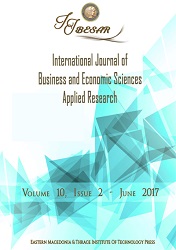The Impact Factor of Education on the Public Sector – The Case of the U.S.
The Impact Factor of Education on the Public Sector – The Case of the U.S.
Author(s): Constantinos ChalloumisSubject(s): Education, Governance, Public Administration, Methodology and research technology, Financial Markets, Fiscal Politics / Budgeting
Published by: Τεχνολογικό Εκπαιδευτικό Ίδρυμα Ανατολικής Μακεδονίας και Θράκης
Keywords: Education; Public Sector; U.S. Education; Theory of Cycle of Money; R.B.Q. methodology; Q.E. method;
Summary/Abstract: Purpose: To this thesis is analyzed the impact factor of education to the public sector and tax system, through a procedure of theoretical and mathematical analysis, a quantification method, an econometric method and behavioral scrutiny by a real case scenario. This work compares the cycle of money, to the one case using the impact factor of education and to the other case without it. Then, this work aims to study if the taxes for the education don’t belong to the general approach that taxes make weaker the cycle of money, but have a positive effect on the economy, are a different case as the theory of the cycle of money provides. Design/methodology/approach: The analysis stands on the cycle of money and the impact factor of education. Therefore, the appropriate education to the economy supports the market and in general the economy. The impact factor of education enforces the economic dynamic of any economy. The study of cases when there is the factor of education and when this factor is omitted allows the extraction of the appropriate conclusions. Moreover, this analysis is used for the Q.E. method through R.B.Q. model. The use of simulations before the real application guarantees the significance of the results. To be able to understand the way that taxes for the education system, estimated to the one case how the economy interacts with these taxes and after this examination without these taxes, following the mathematical logic of the “reductio ad absurdum”. Finding: The education of the U.S. for the period of 2012-2017 shows that taxes for education return to the economy, enhancing it. The general approach of simulation complies with this real case scenario. Research limitations/implications: This paper shows that according to the theory of the cycle of money the education belongs to the case of factors that the taxes return to the economy, and robust the economic dynamic of a society. Originality/value: The findings of this study contribute to the existing knowledge regarding the concept of the cycle of money to the case of education. The taxes on education belong to the case that the money returns to the economy, on the contrary with most taxes that are not robust the economy and should be reduced.
Journal: International Journal of Business and Economic Sciences Applied Research (IJBESAR)
- Issue Year: 13/2020
- Issue No: 1
- Page Range: 69-78
- Page Count: 10
- Language: English

